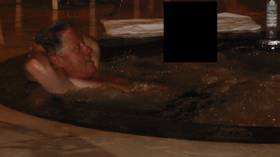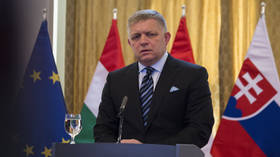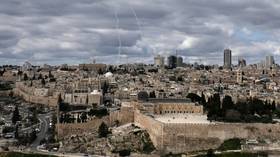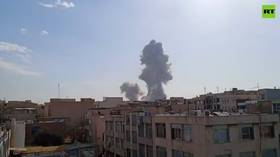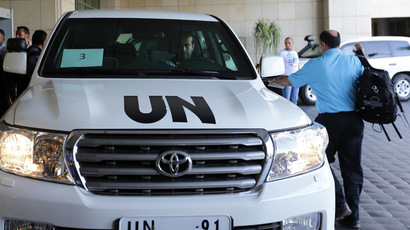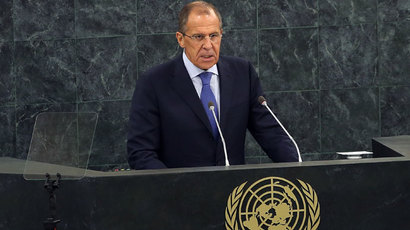Turkey will pay for harboring ‘terrorists’ – Assad
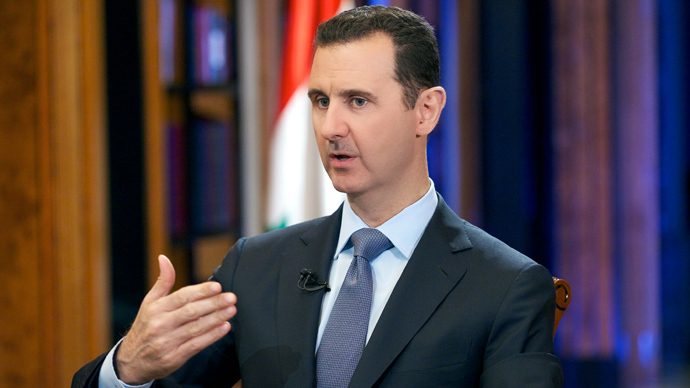
Syrian President Bashar Assad said that Turkey will pay a “heavy price” for harboring and backing “terrorists” in order to oust him, warning that soon enough the terrorists will turn on Turkey.
Assad referred to Turkish Prime Minister Tayyip Erdogan as "bigoted" and accused Turkey of aiding terrorists by allowing them to cross into Syria, Reuters reported, citing an interview with Turkey’s Halk TV.
"It is not possible to put terrorism in your pocket and use it as a card because it is like a scorpion which won't hesitate to sting you at the first opportunity," Assad said. "In the near future, these terrorists will have an impact on Turkey and Turkey will pay a heavy price for it."
Turkey is home to about two million refugees who have fled Syria since the country’s unrest began in March 2011. Turkey is also one of the biggest supporters of Syrian opposition forces. The country plays a key geopolitical role in the conflict, as it shares a 900-kilometer border with Syria.
Assad claimed that Erdogan has a sectarian agenda, since his AK Party has origins in conservative Islamist politics. "Before the crisis, Erdogan had never mentioned reforms or democracy, he was never interested in these issues ... Erdogan only wanted the Muslim Brotherhood to return to Syria, that was his main and core aim," Assad said.
However, Turkey in the past pointed to years of building up a good relationship with Syria before the civil conflict erupted there.
The Syrian government points the finger at the radicalization of opposition groups. Just last month, the Al-Qaeda-affiliated Islamic State of Iraq and the Levant (ISIS) seized the small town of Azaz – located just five kilometers from the border with Turkey - and has been fighting alongside the local Northern Storm brigade.
Russia says the incident provides more evidence that extremism is winning against the moderate opposition. "The balance of power among the opposition fighting forces is stacking up decisively in favor of the Islamists," Foreign Ministry spokeswoman Maria Zakharova said in a statement. "We are by no means gloating about this - clearly a dangerous new act in the bloody tragedy is unfolding.”
"We warned of such a turn of events at the very beginning of the Syrian epic, when our opponents, hoping for the regime's swift fall...were ready to support any forces calling for the government's overthrow," she added.
So far it is unclear whether Assad will run for president next year because of the constantly changing situation on the ground. The situation will be clearer in the next four to five months and will depend on what the Syrian people want, stated Assad.
The United Nations estimates that more than 100,000 people have died since the uprising against Assad began in March 2011, and says it has been notified of at least 14 chemical attacks, Reuters reported. In the interview, Assad denied using chemical weapons, blaming the opposition for the attacks.
The UN Security Council has unanimously adopted a resolution outlining the details of taking Syria’s chemical weapons under international control and ultimately destroying them.
All parties in the Syrian conflict must engage constructively at the upcoming Geneva-2 conference, which would be a significant step towards the “creation of a democratic state that guarantees the human rights of all in Syria,” UN Secretary-General Ban Ki-moon said in his address to the Council.
The target date for the new peace conference in Geneva is set for mid-November.


